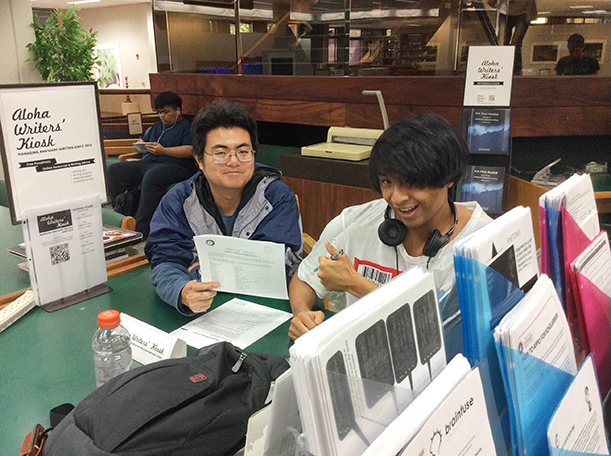By Cody Ng, Kapi‘o Staff Writer
The Aloha Writers’ Kiosk is hub for students at Kapi‘olani Community College to obtain help with writing and editing in a face-to-face environment.

David Uedoi working with a student on his writing at the Aloha Writing Kiosk in Lama Library. Photo: Davin Kubota
The service’s acronym, AWK, fits appropriately with its purpose because the term “awkward” is often used by professors when editing papers. AWK offers students help with anything from grammar issues to writing processes.
English professor David Uedoi founded AWK with colleagues Davin Kubota and Porscha dela Fuente, who help maintain the kiosk. A support group includes Susan Kazama, Nawaa Napoleon, Joyce Tokuda, Joy Oehlers and Shellie Numazu. Other KCC writing instructors also volunteer their time to assist students at AWK. Services are offered in designated areas of Lama Library and the Kahikoluamea Center.
With KCC’s diverse student population, writing instructors saw a need to provide a service of writing support across the disciplines.
This program started on September 8, 2014, the third week of the current fall semester. AWK will be open to students until the last day of instruction of this semester, December 11, 2014, and will open again at the beginning of the spring semester in 2015.
“The number of available face-to-face writing tutors were decreasing,” Uedoi said. “Some students prefer or benefit more from face-to-face tutoring. We wanted to ensure such tutoring would still be available for all students and all their writing concerns for any course.”
AWK helps students of any and all levels of writing experience, from any discipline, with generating and developing ideas, structuring papers, using proper grammar and syntax, and other writing essentials. AWK also helps students by providing a much-needed area to ask questions and focus in a face-to-face environment without the problem of outside distraction. AWK tries to be student-oriented and focuses on improving upon writing weaknesses in a positive manner.
Not only does the writers’ kiosk help the students, it also benefits the instructors who volunteer. The professors are able to improve upon their face-to-face guidance.
“When I work at the Kiosk I don’t feel like a teacher who is grading and lecturing a class,” Uedoi said. “Instead, I feel like a veteran student helping another student by listening to them and suggesting various strategies or directing them to useful handouts, guide books, websites, etc.”
